Virtual events reach target audiences as effectively as—if not more effectively than—on-site events.
Whether you choose to host a fully virtual event, or a hybrid event with both virtual and on-site components, your virtual event platform will need to support the experience you wish to create for your attendees and your ability to achieve your virtual event objectives.
What Is a Virtual Event?
A virtual event is an interactive, multi-day and multi-hour virtual program that creates an immersive experience for large audiences (scalable to 200,000+ attendees) hosted in a fully interactive 2D or 3D environment.
Virtual technology enables networking, gamification, polling, Q&A, chat, social integration, quizzes, surveys, and various options for sponsorship and monetization. They are best suited to trade shows, user conferences, product launches, sales kickoffs, town halls, trainings, and recruitments.
There are three types of virtual events that require a virtual event platform to accommodate the features and functions required to make a flexible, scalable, wildly successful multi-session virtual event.

Multi-Session Event: This type of event is often used for the purpose of training, where multiple webcasts are offered which include interaction. The features and functionalities needed are simpler—for instance, you can accommodate sponsorship opportunities, but not in the form of a booth.
For example, the Rowan-Salisbury school system in North Carolina needed to move its annual conference for teachers and staff to a virtual platform in 2020. The conference is designed provide workshops and educational sessions that further professional development.
The Director of Professional Development could have chosen to use a meeting software like Zoom or Teams, but wanted more—she wanted to create an unforgettable experience for her constituents. The school system used a budget-friendly do-it-yourself virtual event platform that allowed them to easily build 40 sessions and 10 virtual spaces while providing robust analytics. The result: an 800% increase in attendance and an overwhelmingly positive response.
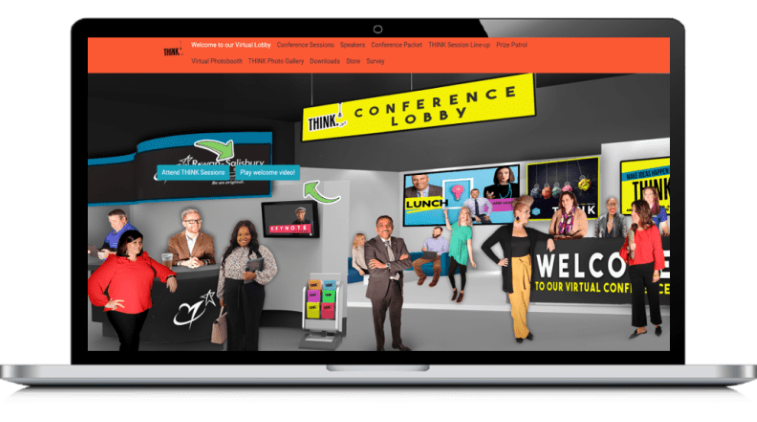
Multi-Session Trade Show: This type of virtual event includes an exhibit hall, affording the option to hold sessions and provide robust networking capabilities, while also enabling exposure to your sponsors’ and partners’ brands of products and services.
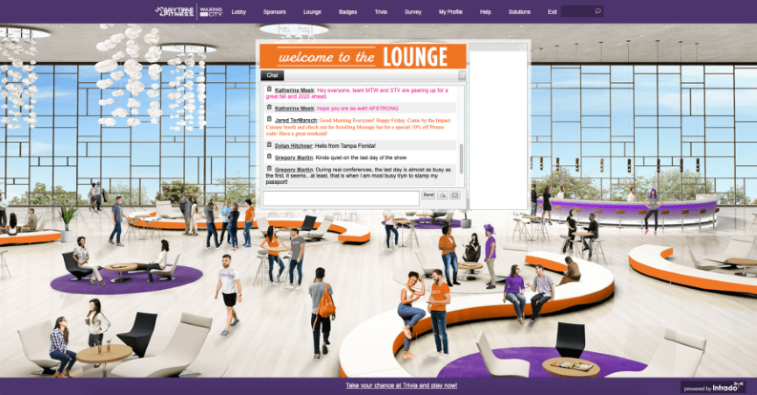
365-Environment With Multiple Live Days: This type of virtual event emulates on-site multi-day conferences and events, but with added value, and is it is not limited by time or physical space. Through the virtual event platform, you can create a unique experience that can begin as early as the day you begin planning, continue through promotion, registration, the main event itself, and long after—for as long as you have content and connections to keep it going.

The Elements of a Successful Virtual Event
Successful online event hosting means creating excitement, learning experiences, networking opportunities and memorable moments like those of an onsite conference or product launch, with the benefit of unmatched flexibility and scalability.
As with on-site events, when hosting an event online you have the ability to create a lobby area and warm welcome for your attendees, create a main stage and offer moderated plenary and presentation sessions with multiple speakers and Q&A (without worrying how to get the mic across a long aisle of attendees). With the right virtual event platform, you can create networking spaces and designate some for special audience segments, like first-time attendees, high-value clients, new members, investors, etc.
You can also create exhibit booths to bring sponsors in contact with attendees. And unlike on-site events, in a virtual event space, it is possible to find a unicorn: a quiet, comfortable place to meet one-on-one—using video chat technology.
In addition to providing the virtual event space and content programming, with virtual event software, you can create all the buzz that would energize your onsite conference or product launch. You can encourage social engagement, invite attendees to participate in surveys, and use gamification to get them more involved and interacting with the event and with each other. And with a mobile-friendly virtual event, you can ensure that your audience can participate anytime, anywhere on their favorite device.
The Benefits of Virtual Events: Robust Analytics
Equally important is the ability to capture rich data—a feature of online virtual events that often excels over on-site activities. With the right virtual event platform, you can automatically capture an array of data points that you would not easily be able to capture in a physical space. You can capture demographic data which tells you where your audience is located, and behavioral data providing insights like audience trends, content interests, and other insights that will help you better understand your constituents so that you can continually improve your programming.
For example, in an on-site event, you may need to assign staff at every door, scanning badges to get an accurate headcount for a sponsored session. In an online event, the virtual event technology does that for you, and it tells you how long you retained your audience and how often they interacted with content and each other—something you are not likely to gather from the plenary in your annual convention. All of that data is housed in one place so you can feed it back to your executive team and out into the planning of your next virtual event.
Advantages of Hosting a Virtual Event
Hosting a virtual event is not only about emulating the in-person event experience, but about the opportunity that is enabled by the flexibility of the environment. With virtual event platforms you can create your own uniquely customized environment and invite your audience to join you there for a truly unique experience.
-
Virtual events are flexible. Given the capabilities of the virtual event platform and virtual event software, you can be even more creative in orchestrating spaces and engagements to fully activate the online experience.
-
Virtual events allow you to build a global community. Online tools allow you to foster personalized networking and engagement among attendees who might otherwise never meet in the outside world. You can create the space and the spark that not only brings people into a closer relationship with your organization, but you can use your event and your software to bring them into contact with one another. And with the virtual event platform, engagement is “always on.” You don’t have to wait until the live day to connect with your audience. You can schedule activities before the event, throughout the live period and even post-event to take advantage of the full event life cycle. This creates an opportunity for you to build and grow a community beyond a moment in time and physical location.
-
Virtual events extend reach and connect with broader audience. Employing a virtual platform can enable you to expand your reach to those who, for reasons of time or travel expense, would not normally attend your event onsite. Plus, it is a great way to reduce the carbon footprint of your event and still accomplish your mission. With a virtual event platform, your audience can be as large as 200,000 attendees around the world, and you can ensure that each attendee is offered a rich and authentic virtual experience.
-
Virtual events provide more insights. You can use your virtual event platform and virtual event software to heighten digital engagement and capture data and insights you might not garner at an onsite event, gather it in one place, and provide the dashboards and reporting tools to enable you to analyze it for greater insight into the highlights of the event and audience behavior.
-
Virtual events extend the life of the content and accelerate brand identity. The virtual event platform allows the engagement and brand exposure to begin long before the main event and go on through the creation and repurposing of content. From the data you gather, you will know which assets sparked the most engagement, and what your audience was saying about it, and can use that insight to add, subtract, or otherwise modify the content to reinvigorate the interaction among attendees—to keep the networking and value going. The virtual event platform allows your audience to access and consume content on demand when they are able.
All you need for successful online event hosting is the right virtual event platform.
What Is a Virtual Event Platform?
A virtual event platform is a virtual environment and tool that allows you to create the virtual version of an on-site conference or trade expo that people can attend online.
Users should be able to do the same things they would do in an onsite event that would support their event objectives, only virtually and with greater flexibility and scalability: multiple activities, speakers, networking opportunities, booths, etc. Unlike a virtual meeting, which places every user in one “room,” virtual event platforms can enable presentations delivered by a panel of speakers, and all attendees are in the audience.
Administrators have an array of ways to engage with attendees, including waiting rooms, polls, Q&As, live chat, gamification, and more. The resulting data that can be retrieved and analyzed is often more robust because the platform is equipped with analysis tools and reporting features.
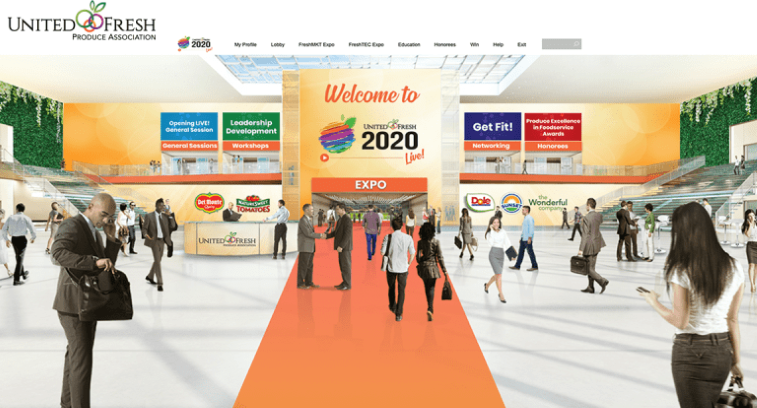
Virtual Events: Determining Factors
The type of event you are planning—a sales kickoff, a virtual investor day, a multi-day conference—will underpin the type of platform you need because it will underpin your virtual event objectives. The reasons why you are gathering will be instrumental in determining what it is you want to achieve when you orchestrate the event.
Your event goals and objectives: It is most important that you articulate and prioritize your event objectives. You will need a clearly defined set of strategic objectives for the organization and for the attendees in order to evaluate a virtual event platform.
Virtual event platforms and virtual event software offer the opportunity to construct your event in an infinite number of permutations. The process of planning your virtual event and choosing your virtual event platform can become overwhelming without a set of clear, agreed-upon, overarching objectives because these will be the foundation for every feature and function you need from your virtual event platform and virtual event software.
Event objectives can be a combination of things like lead generation, building community, educational experience, brand building, connecting with stakeholders, or connecting with internal workforce. Even in a flexible, scalable virtual event space, you will want to prioritize your objectives so that you build the event that best enables you to achieve your goals and, of course, report on your successes. In a tool that allows you to do so much, it is possible to lose focus and try to do everything at once, so it is best to align your plan as closely as possible with your overall event objectives.
Whether you are planning a new virtual event, or the next iteration of a flagship event, gathering stakeholders in an exercise to define and prioritize your strategic objectives will be key to how effectively you can define your needs, and what capabilities you will need before, during and after your event in order to assess a provider. Be sure to consider your objectives at the organizational and individual level—incorporating the individual goals and desires of your audience among your organizational objectives.
The size of your event will also affect which virtual event platform is best suited to your needs. Are you hosting a virtual corporate event like a town hall meeting for 500 employees, or an annual membership conference that needs to accommodate tens of thousands of global attendees? The size of the audience you intend to support and how you would like them to interact will matter in selecting your virtual event platform.
What does the ideal event experience look and feel like? When you envision your event, what look and feel best suits your brand? What kinds of opportunities are you trying to create to achieve your virtual event goals and objectives? Do you envision a responsive design or a 3D environment?
A responsive, or 2D, design environment is based on a flat grid layout and uses simple buttons and labels, similar to a web page. This design option is a bit more content-forward and can typically look like an extension of your company website.
A 3D environment uses angles, texture and depth to give users the feel that they’re in a three-dimensional space. A 3D environment may also use visually rich photography to make users feel like they’re walking through a convention center, an outdoor veranda or an elaborate exhibit hall. This design option is focused more on the visual experience with the content integrated within it. Use event objectives to guide your decision—sometimes simpler is better.
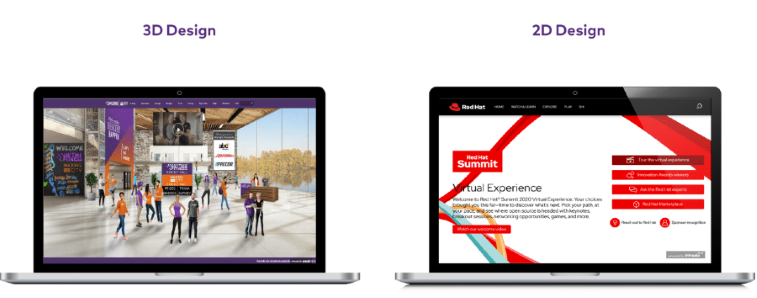
And what do you need the event to do? Raise brand awareness? Build community? Generate leads? Attract sponsors? Test learning? Will you need a mix of live, simulive, and prerecorded content?
Depending on the answer(s), you will need to create opportunities for attendees that support your goals, and the virtual event platform and virtual event software will need to support your vision. If this is your first virtual or hybrid event, it may be helpful to find a virtual event platform offered by a vendor who also offers production services. A team that provides guidance through the entire process of planning, marketing, and hosting an engaging experience can be a good investment, ensuring that your event fulfills your vision and your business objectives.
Consider your budget. In a recent survey conducted in early 2020, 78% of marketing leaders said they expected to increase or significantly increase their budgets when it came to virtual events. Your budget may very well determine which platform and which features and customization you are able to incorporate into your virtual event plan. Finding the provider who offers you the best package of features and capabilities will be key to achieving your outcomes and will likely be more affordable than trying to purchase services a la carte. You’ll also want to be able to evaluate you ROI once the event is over. Make sure that your virtual event platform allows you to capture cost and revenue data for a thorough and clear analysis, and that it provides reporting tools that help you provide visual and accessible reports to your stakeholders to show how their investment in the event paid off.
When thinking about budget, consider hard costs and soft costs. Hard costs include the event technology, equipment, etc. Soft costs include the human capital of time and resources required to effectively plan, market, and deliver. Bear in mind that, with virtual, your staffing needs will have changed, and you may need to assemble a different team with a different set of more technical skills. To offset these costs, you can monetize with sponsorships. Event packages can include sponsorship of session tracks or individual sessions, conference WiFi, or charging stations. In the virtual space, there is a wealth of digital inventory to monetize: badging/gamification, networking lounges, exhibit booths, welcome messaging, and video throughout the event.
Virtual event platforms can enable many opportunities for monetization as a means to making your budget stretch a little more.
Once you have decided on your primary objectives, you can begin to map out the desired user journey and the specifics of what you want to accomplish. You’ll begin to see which features and functions are most important to your plan, and this will become the checklist you should review with your prospective vendors to assess their capabilities.
Planning a virtual event can get complicated—there are so many options and much of the technology is new. If as you do your needs assessment, you realize that you could use some help with your strategy and planning, consider including consulting services in your budget. Planning a virtual event may require knowledge and skills that are not inherent in your team. From strategy and planning to implementation and delivery, a consulting services team can help you achieve your vision more efficiently and effectively, making this a good investment in the success of your program, and a way to build your own skillset while learning from the experts.
Virtual Event Case Study: ASHP
For example, in 2020, the American Society of Health-System Pharmacists (ASHP) needed to pivot their annual Midyear Clinical Meeting & Exhibition from an onsite to virtual event. They chose to use scheduled breakout rooms and 1:1 video chat to achieve their goals.
Upon entry, the 27,000 attendees started their journey in the ASHP lobby and were greeted by a video welcome. Notified’s 3D platform delivered an online environment that mirrored an in-person event. Throughout the meeting, attendees were able to view live keynotes – which included celebrity guest speakers – and breakout sessions, as well as on-demand video content.
On the platform, ASHP was able to have a virtual Residency Showcase and Personnel Placement Program, providing booths where attendees could explore career options. Attendees were also able to interact at booths in the virtual exhibit program.
In total, there were nearly 500,000 visits to various booths, delivering value to the organizations that participated. The five-day event was deemed a success for the pharmacists, student pharmacists and exhibit personnel who participated, and it was all achieved on a virtual event platform.
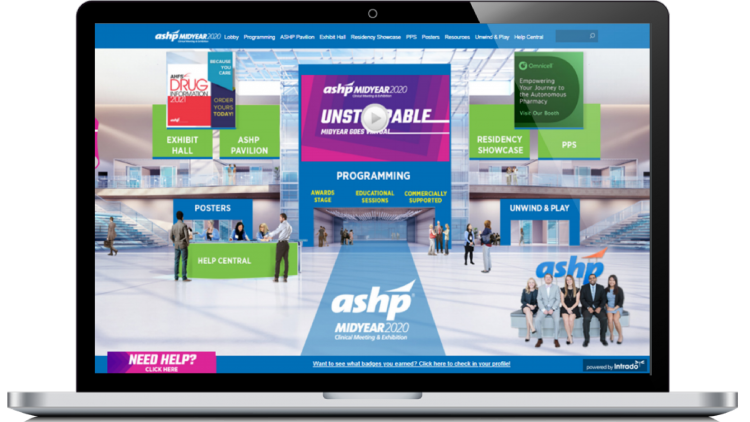
Features and Functions of a Virtual Event Platform
No matter which virtual event platform you choose, there should be some basic requirements you consider in addition to whether it enables you to achieve your event objectives—it should be easy for the event team to use, and it should create a seamless and high-quality experience for your attendees.
The technology you choose should be equipped with robust engagement tools built for the enterprise with security, integration options and scale in mind, allowing you to engage attendees globally in a single event. The analytics and reporting portal should integrate with your marketing tech stack and provide you with real-time metrics and insights about your audience.
Asking these ten questions as you begin your interview with prospective vendors will help you quickly sort out any that are not flexible nor scalable enough for consideration:
- How scalable is your platform? How many concurrent attendees can it support?
- Is it mobile-friendly? Does it support iOS, Android and Windows?
- Does it support 2D and 3D experiences?
- Does it offer an agenda builder?
- What kinds of event spaces does it accommodate?
- What types of engagement devices does it offer?
- Do you offer event planning, production services, and support during the live event?
- Does the platform offer real-time analytics?
- Is reporting customizable?
- How long will we have access to the site?
And as you drill down into the details and begin to flesh out your research into which provider and platform are best for you, here are some other aspects of virtual event planning that you will want to explore, and some helpful questions to ask when interviewing prospective partners.
Customization/Branding: This is your event, and it is essential that your brand be prominent, pervasive, and displayed in a professional manner throughout the experience. To make the platform look and feel like yours, you will likely want a virtual platform provider who can provide you with these essentials:
- Branded event website
- Customizable registration capabilities
- Branded web room
- Customizable email templates
Questions:
- What customization features do you offer on your virtual event’s platform?
- Does your platform support branded web rooms and branded event websites?
Event Management Software Integrations: If you already use event management software, you will need a platform that connects easily with yours. Seamless integration enables you to store data and deploy everything from email to social posts to push notifications and email marketing without having to maintain two operating systems. Ideally, the virtual event platform that you choose will offer venue management, agenda management, and speaker management to allow a simple, cohesive planning experience. You’ll want to know if the product integrates with your CRM, HR, calendar, SSO, domain name setup and labeled apps. And if you are connecting your platform to anything outside, you always want to query their security to protect your data and your constituents.
Questions:
- Does your virtual event platform integrate with my event management software platform?
- What kind of cybersecurity do you employ? What are your practices for ensuring a secure environment and transfer of data?
- Does it offer event registration? Can it handle different pricing packages?
- What kind of email marketing capabilities does your platform have?
- What kind of features and functionalities are included to help me build engagement, and with data gathering, etc.?
Networking and Engagement: Your attendees are here to connect, and you want them to be as engaged as possible with each other, with the content, with booths and spaces and sessions. And amid that engagement, you want to be gathering information about them and about your virtual event. To accomplish this, you will want a virtual event platform that enables you to create spaces for different use cases and that offers capabilities such as video chatting, messaging, or group chats, Q&A, live polling, and feedback surveys. Be sure to ask your prospective vendors for a list of networking and engagement features and to show you how they will appear to your audience.
Sponsorship Opportunities: If you include sponsorships in your virtual event model, they can go a long way in offsetting the costs of your event and making that ROI number look even better. As mentioned above, finding opportunities like these to spotlight sponsors makes your virtual event more competitive for sponsor advertising dollars:
-
Online exhibit hall
-
Main stage
-
Networking spaces
-
Social media channels
-
Rotating ad banners promoting breakouts
-
Gamification with sponsor messaging
-
Personalized digital briefcase where attendees store event content
Questions:
-
What sponsorship options do you offer in your platform?
-
Can I create my own sponsorship packages from your options?
-
Are there personalization features on your sponsorship types?
Exhibit Hall: Like the exhibit halls and vendor booths you see at on-site trade shows and conferences, the virtual exhibit hall is a great forum for sponsors, organizers, and attendees to connect around in the virtual event space. A virtual event booth with integrated live video conferencing and reporting lets you convert event leads into qualified opportunities.
Questions:
-
Does this platform support virtual booths that enable event attendees to connect with subject matter experts face-to-face?
-
Do the virtual booth features allow for sharing digital collateral all in one tool?
-
Does this platform provide a direct line of sight into leads and opportunities generated at events?
-
What engagement features are available to facilitate the interactivity between booth sponsors and booth visitors?
Live Broadcast: Live broadcasts on the right virtual event platform allow multiple people to present at the same time. The “live” aspect creates for your attendees a sense of being “in the moment” at your event—a part of something bigger, and more connected to a group of people with similar interests. Live broadcasts also create an environment that allows you to incorporate live polling and Q&A to engage the audience while gathering important data about how they think and feel.
Questions:
-
Does this platform support live to broadcast?
-
Does this virtual events platform support closed captioning? automated subtitles in different languages?
-
Does this platform support multi-speaker sessions?
Pre-Recorded Content: Pre-recorded content can resolve issues around a speaker not being available to attend in real time, whether intentionally, or as a last-minute conflict. It can also be an asset you offer in gamification or in a resource library. If it figures into your content strategy, you will want to know if the platform allows for the upload of pre-recorded content, and whether scheduling the content is an option.
Social Media Integration: Social media integration makes it possible for attendees to share their experience with others inside and outside of your virtual event directly from your virtual platform to generate more buzz around your virtual event.
Questions:
-
Does your platform integrate with social media networks? If yes, which ones? What does the experience look like to attendees?
Live Support for Staff and Attendees: No matter how well you have prepared, things can happen which will require real-time support, just as they do at on-site events. Having a provider who plans to be there for you to help resolve issues will be a valuable asset. On-demand support team for the organizer and a live chat support feature for the attendee should be part of the package.
Questions:
-
Will you provide live troubleshooting during our event? To staff? To attendees?
-
How do you resolve technical issues? Tell me about the process.
-
Do you offer training on how to use the platform? to staff? to attendees?
Analytics and Reporting: Let’s be honest: The data is one of the most valuable assets generated by your virtual event, second only to the knowledge that you have created a memorable experience for your attendees. Knowing what is offered as part of the platform package in terms of data gathering, analytics, and reporting is decision critical. In particular, it’s important to know whether customization is an option when you need it, and whether you can get support in performing your analysis if you know what you need, but can’t seem to figure out how to get it.
Questions:
-
Does the platform provide a real-time metrics dashboard?
-
Does it allow you to collect and analyze data that helps you evaluate both your ROI and your ROO?
-
Is it possible to request customized reporting if the out-of-the-box reporting doesn’t meet all needs?
In addition to capabilities, you’ll want to ask your provider about how long you and your audience will have access to the site and its contents (and their technical support) once the main event is over. After the main event is over, you will still be gathering data and can continue to post content, create social campaigns, and draw people into your virtual event site. You’ll want to know you have access to keep the conversation going.
In Summary
Whichever platform you choose, consider how it can be used after the main event, and how it will integrate with your own native platforms and systems while you keep the conversation going.
As the world rebounds from the effects of the COVID-19 pandemic, it is likely that virtual events will retain their popularity given their proven value either as replacements for onsite events or as augmentation in hybrid activities going forward. Consider whether your partner/platform is likely to grow and evolve with you. Virtual event technology is changing and evolving. You need to select your platform and partners with a high level of confidence that both will be there for you in the long term.
Get a Demo of Our End-to-End Event Platform
Whether you’re hosting virtual or hybrid events to reach customers, employees, investors, or partners, Notified is here to help bring your vision to life.
We host over 100,000 webcasts and virtual events annually on behalf of thousands of customers around the world while providing dedicated support with a focus on data.
All virtual events include:
- Dedicated project manager
- Interactive environments with live & on-demand programming
- Flexible branding and personalization options
- Accessibility – anytime, anywhere, and from any device
- Robust analytics and reporting
And, from strategy and planning to implementation and delivery, our consulting services team supports you every step of the way.
Contact us today to set up a free demo and learn more about our services.
